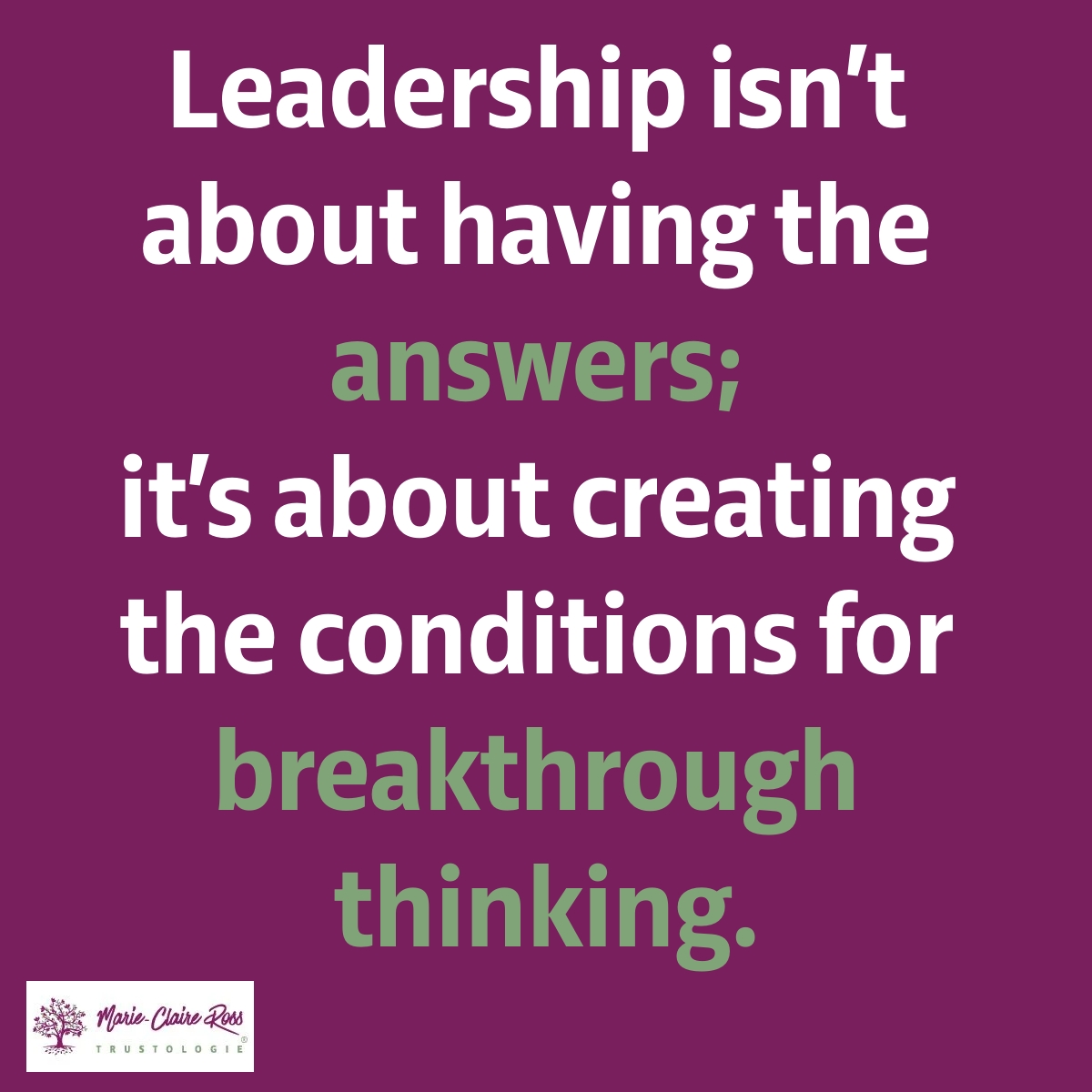8 min read
Beyond the "Why": 5 Coaching Secrets to Unlock Curiosity in Leadership
When my daughter was 17 months old, she discovered a superpower: the word “Why?”For the next two years, it was her response to almost everything.
Develop leaders, strengthen executive teams and gain deep insights with assessments designed to accelerate trust and performance.

Transform how your leaders think and perform with keynotes that spark connection, trust and high-performance cultures.

Explore practical tools, thought-leadership and resources to help you build trusted, high-performing teams.

Trustologie® is a leadership development consultancy founded by Marie-Claire Ross, specialising in helping executives and managers build high-trust, high-performing teams.

5 min read
Marie-Claire Ross : Updated on January 28, 2026

In my work, I have the privilege of coaching leaders across a vast spectrum of industries, organisational sizes, and stages of maturity. This birds-eye view has revealed a critical distinction in "star" talent - specifically the difference between those who deliver results today and those who will lead tomorrow.
Often, high-performing employees and those identified as High Potentials (HIPOs) are enrolled in my leadership coaching programs or leadership development course when they are transitioning into a pivotal new role. While high performers are recognised for their current excellence, HIPOs are those with the specific agility and aspiration to step into much larger, more complex responsibilities.
Sometimes these individuals have been in leadership for years but have never received formal professional development; other times, they are the "rising stars" being fast-tracked to sustain the company's momentum. What is always eye-opening for me is working with organisations that have been too "high-growth" to pause for training. These companies generate above-average value, yet their leaders are often running on pure instinct rather than refined skill.
When I finally sit down with these high-performing individuals and HIPOs, I get excited. They have experienced growth opportunities that most only dream about. However, I’ve learned that not all star performers are equal. Current success is not a guaranteed predictor of future leadership wisdom. Some learn from their experiences at a deep, transformative level; others simply rely on their natural talent until they hit a ceiling.
Let me break down the four types of top high-performing individuals, based on my Achievement Zone Model, in my book, Trusted to Thrive (get a free chapter here) that I see:
This type of top-performing employee is rare. In fact, most of the time they would nominate themselves as an anxious high performer. A key trait is that they're humble. Even when they have achieved a new milestone, they are onto the next one. There is no time to celebrate their accomplishments.
What is striking about them is their hunger. They are hungry to learn, try new things, take actionable steps and get results. They put their hand up for challenging projects.
Their attitude also makes them different from average performers. They have a a positive outlook and they thrive on regular feedback.
They do the work on themselves to maintain a positive mindset. They are disciplined. Very disciplined. Many of them have a morning routine.
This means they are often up early exercising or meditating. It also includes some type of learning whether that be reading a book, doing a course, listening to a podcast or reading the success stories of others. They don't just learn on the job.
They are also very mindful about improving their level of performance. It's why they are dedicated to continuous learning, so they have the inspiration they need to try new things. Their growth mindset means they are always involved in professional development and setting new business goals.
During a leadership workshop, they stand out by their measured, well-thought out responses. They write a lot of notes and they do the homework. They are one of the few that take the time to reflect on their successes and failures. Their self-awareness is higher than most. But they will still beat themselves up for taking to much time off on the weekend or taking their eye off the ball. They are also more likely to ask me deep questions.
Achievement Zone performers tend are very driven. They hit the Achievement Zone when they believe in themselves and their people. When they let their fears subside. They are team players and people love working with them which is why they quite naturally lead a high-performing team. Their excitement and ability to communicate a clear vision is inspiring to all.
Typically, they are founders, CEOs or on a fast track to being an executive.
The anxious high performer is the most common. They have been working hard for years - even before client demand accelerated. In fact, their constant worry about doing the right thing, considering the right options and working out the best way forward uses up a lot of their energy.
When they finally get a break and attend a leadership workshop with me, I see their worried faces. It takes a while to get them to smile and relax. The first joke helps crack the veneer and by the second joke they let themselves open up and have a laugh.
They are attentive learners. They write lots of notes and think deeply about questions. I love seeing them talk to their peers about topics that normally don't get discussed. You can see the relief on their face as they realise they are not alone. They are visibly excited when they receive an insight or a new tool that helps them connect the dots on something that's been bothering them.
The anxious high performer is conscientious and works diligently to solve problems and get things done.
But they are often their own worst enemy. They know that what energises them is time alone to think. Yet, many of them haven't carved out alone time in months. And it shows. They often feel guilty about all the things they haven't done.
This would have to be the second most common superstar employee that I encounter. You could say they have been lucky to fall into a job that's in an industry that's booming. They love their job, the money they are making and they celebrate their success.
They spend years working at an accelerated pace busily trying to meet client demand. They learn quickly on the job. After all, there is no time (or desire) for them to improve their leadership capabilities in a more formal setting. Instead, they tend to learn from talking to their peers or customers. Professional relationships are important to them. They rarely (if ever) spend time to reflect on their progress or take stock of what's working or not working.
So when they can finally have a breather and can spend time in a workshop with me, they stick out like a sore thumb. They struggle to write notes or answer questions. They are the first to finish an exercise and get on their phone and scroll.
For many of them, their self-identify is so wrapped up in their work, they don't know themselves. More importantly, they don't know what they like to do or what even brings them real happiness.
For some challenging roles, such as management consultants or lawyers, they can survive like this for years. In fact, some can spend their whole careers in this mode (which is why they have to leave at 60, because they are too burnt out to make it to 65).
But I see a lot of executives, who have received promotion after promotion in a fast growth company, to suddenly have to take stock when revenue drops or falls to a more normal growth level.
Accidental high performers then struggle. Their success streak is broken. They feel deflated and demotivated. They don't know what to do. All of a sudden what has worked in the past is no longer working. They lose motivation and flail about. Some long for the good old days, not knowing that's firmly in the past.
These are often what I call Abatement Zone leaders - their performance is declining, but they don't know it. Some manage to turn this around. While other fall into the next level of performance.
This type of high achiever is the most rare (thankfully). After all, there is not much commercial demand for leaders who do little to take advantage of opportunities for learning. Typically, they are subject matter experts. The only learning they do is technical.
They are usually over fifty. Their value is in their ability to know and do stuff that the organisation still requires. They have clients that value their expertise, so they are still good revenue generators. But they no longer lead people. That's good for them and employees.
Sometimes they get dragged into a workshop I'm running. It's not fun for them or me. They are pretty grumpy and argumentative. Most times, they just want to be seen and noticed. They are only just holding onto their high performing status - and they know it. Their glory days are behind them.
Maintaining high performance is a daunting task, but maintaining high potential is even more complex. While high-growth companies provide a thrilling backdrop for success, it is crucial for both star performers and HIPOs to continuously broaden their skill sets. Without refining leadership capabilities - particularly the "soft skills" of emotional intelligence and strategic thinking - even the brightest HIPO will eventually hit a ceiling.
Many leaders face challenges not only in adapting to change but also in guiding their teams through unpredictable shifts. Successfully navigating periods of declining revenue or market pivots demands leaders who are willing to move beyond "instinct." For a HIPO to truly realize their potential and transition into the Achievement Zone, they must be dedicated to acquiring the essential leadership tools that were likely overlooked during the "busy" years of high growth.
The goal isn't just to perform well today; it’s to build the sustainable habits that ensure you remain a "star" tomorrow, rather than falling into the traps of anxiety or apathy.
If you want to learn more about how to stay in the Achievement Zone more sustainably, come and join my Tribe of Trusted Leaders - Leadership Development Course. Limited spaces open now.

8 min read
When my daughter was 17 months old, she discovered a superpower: the word “Why?”For the next two years, it was her response to almost everything.

11 min read
I have a friend who often finds herself at the mercy of her emotions. Recently, she called me to rehash a confrontation she’d had with a group of...

9 min read
True leadership presence isn’t a performance or a set of charisma hacks; it is the felt experience of who you are being in the room. By cultivating...

Imagine a management team that has had a tough few years - dwindling revenue, archaic systems and processes that need an expensive overhaul and...

High performers are the backbone of any successful organisation. Understanding how to harness their potential can elevate your entire team's...

While it's common to assess employee performance based on tasks, uncovering hidden strengths can yield unexpected outcomes.